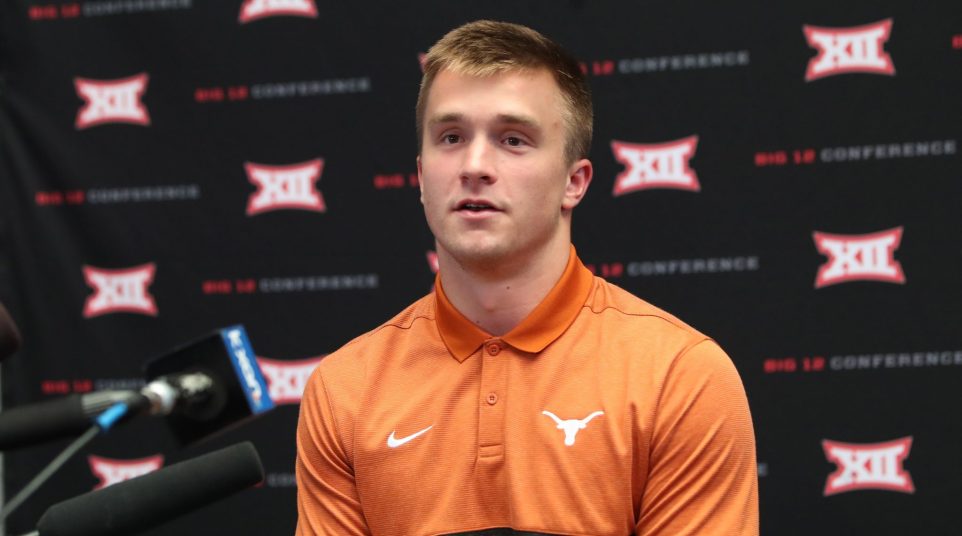
Sam Ehlinger brought up a really interesting point that could become an issue in 2020
When Houston essentially tanked the 2019 season after a 1-3 start, it was met with head-scratches from the college football world. Houston announced that star quarterback D’Eriq King and No. 2 receiver Keith Corbin would redshirt to preserve a year of eligibility.
Why would a team punt on a season after just 4 games? Sure, a rough start fueled that, but the basic premise of throwing the towel on a season in September was, at the very least, bizarre in college football. It goes against everything that’s preached in the major revenue “amateur” sport, especially in a football-crazed state like Texas.
“Tanking” isn’t necessarily the concern of teams in 2020. At least not yet.
But there could be a COVID-related version of that in 2020. That’s not some media narrative. This quote from Texas QB Sam Ehlinger, who is about the last person who one would predict to opt out or minimize the impact college football, was asked by The Athletic about whether this shortened season should count. This was the part of his answer that stood out:
“…And then also if, say, they didn’t (freeze eligibility) and a team started off 1-3, would you have guys saying, ‘Ok, you know what, this year, it stinks. We didn’t start off the season right, so I’m gonna go sit out the rest of the season and say it was for COVID reasoning.'”
To be clear, Ehlinger said he believes that eligibility should be frozen and that players should be allowed to retain scholarships even if the shortened season is played. The NCAA Division I Council supported this after Ehlinger’s quote came out.
The more long-term issue is the point Ehlinger brought up there. In a year in which Power 5 teams are going to get off to rocky starts with conference-only schedules, could we see groups of players who opt out to preserve eligibility?
I’m sure there are plenty of SEC fans who read that and thought “that would never happen to my team. That’s some Big 12 stuff.” In a perfect world, every college player would be active and healthy, and they’d play the entire season in front of capacity crowds. We don’t live in that world. Each situation is unique.
Todd McShay already admitted that roughly half of his mocked 1st round for the 2021 NFL Draft opted out or isn’t playing because of a canceled season. Could that list grow if there’s an elite player who plays for a team that starts off 1-3? I wouldn’t rule it out, especially considering how NFL scouts have already had to come to grips with the reality that more elite prospects than ever won’t be playing in 2020. There’s never been an easier out for college football players.
Now some might say that’s pessimistic and that kids will want to stick it out and play for their teammates. Trevor Lawrence and Justin Fields completely squashed any notion that they’d take the easy way out. Shoot, you’ve got the Big Ten players out here starting viral movements, petitioning and publicly protesting to get the commissioner to reverse his decision not to play a fall season.
Kids want to play football. There’s no doubt about that. I applaud them.
But the circumstances are certainly different now that they could be a month into a season. What we need to remember is that in addition to the health concern, all of these unique outside variables with testing and restrictions are going to make for a different kind of year.
Traveling will be different. Operating in the facility is already different. Playing in front of 20-25% capacity crowds will be different. This is gonna sound like a relatively small point to bring up, but it’s even different to socialize on campus for a college football player. There’s no telling how this is going to psychologically impact 18-22 year-old kids, especially if you throw some conference-title spoiling losses into the mix early on.
Coaches don’t have any sort of experience dealing with that. It’s a totally different animal then say, what Mark Stoops dealt with last year when his team started 0-3 in the SEC but righted the ship. There wasn’t a pandemic hanging over everything like a cloud. It’ll be interesting to see if certain coaches are able to hold their teams together during such weird times.
The word “quit” isn’t so easily defined in 2020. Is it quitting if a starting Mississippi State receiver says, as Ehlinger put it, “you know what? This year, it stinks. We didn’t start off the season right, so I’m gonna go sit out the rest of the season and say it was for COVID reasoning.” For all we know that player is like, “hey, this year does stink and I’d rather have another year of eligibility to play in Mike Leach’s offense instead of wasting it with all of these strange circumstances.”
Those conversations are going to have to happen, especially for teams that get off to slow starts. Don’t take that from me. Take that from Ehlinger. Take that from someone who admitted he cried when he found out the LSU game was canceled. Take that from someone who spent the past 5 months talking with teammates who have had to adjust on the fly with this unprecedented offseason.
As much as we all want our football the way it’s always been given to us, Ehlinger’s comment should serve as a reminder that there are still unprecedented situations we’re dealing with. Just because the #WeWantToPlay movement made such a loud statement doesn’t mean feelings can’t shift after a 1-3 start.
And if they do, well, there’s nothing that any of us can do about it. We’ll just come back to the same point Ehlinger made.
This year, it stinks.
